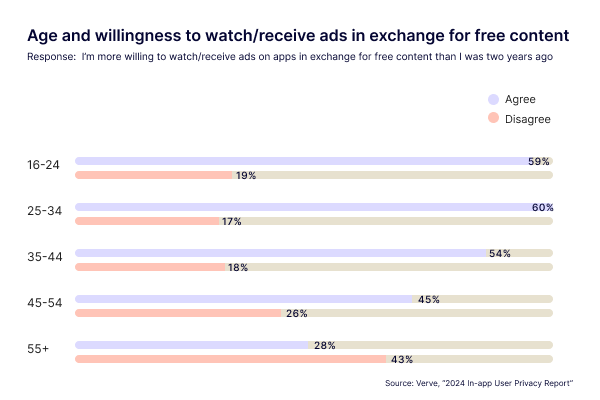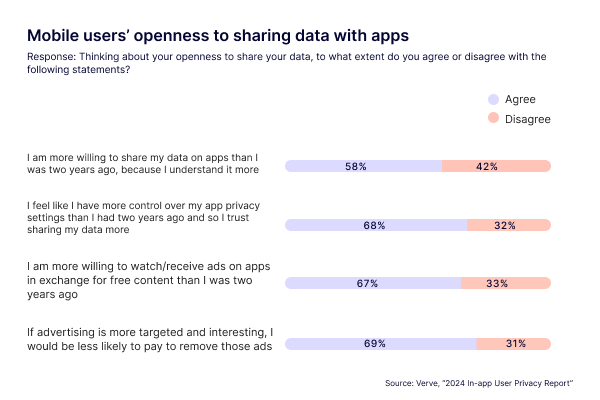More control drives more data sharing: Surprising in-app privacy trends revealed by Verve
Research launched today by Verve has highlighted that while nearly 7 in 10 UK and US consumers (68%) who shared their opinion agree they have more control over their app privacy settings than two years ago, almost 6 in 10 (58%) of consumers are also more willing to share data on apps than before.
The study surveyed 4,001 respondents across the UK and US in August 2024 to explore the current state of in-app advertising and data privacy, from the consumers’ point of view.
Increased willingness to trade data for free content
Of those that gave an opinion, 67% of consumers agreed they are more willing to watch or receive ads on apps in exchange for free content than two years ago, and 69% stated that if advertising is more targeted and interesting, they would be less likely to pay to remove them.

The report identified that consumers surveyed are most willing to share personal data on shopping apps (30%), closely followed by social media apps (28%), and almost a quarter on food and drink apps (23%). Conversely, 53% of all respondents surveyed were unwilling to share any personal data on dating apps. On average, just under half (48%) of Gen Z respondents were willing to share their name across all app types, with only 3 in 10 of those aged over 55 prepared to do the same.
A greater appreciation of relevant advertising
Consumers from the UK and US also shared their reactions to relevant advertising on apps, with three-quarters (75%) of respondents who shared an opinion stating they appreciated seeing content for free due to receiving relevant ads. The study highlighted that consumers surveyed also recognize the role of relevant ads when shopping, with 81% of respondents saying that relevant adverts helped them to find products they didn’t know existed, and 69% saying they made shopping quicker and more efficient.

Continued demand for stronger privacy safeguards
In parallel with their enhanced sense of data privacy control, however, consumers remain apprehensive about how their information is protected and used. Just under half (44%) of those who gave their opinion are more concerned by the possibility of unauthorized parties accessing their data than they were two years ago, with 40% also citing increased concern around not knowing the purpose for which their data will be used.
Overall, three-quarters (75%) agreed that there is still more to be done in communicating how consumer data is used; with study findings highlighting three main action actions for app publishers to improve consumer trust in apps. Alongside providing better assurance that data isn’t being shared with third parties (35%), this includes ensuring understanding of exactly how data is being stored or handled (34%) and offering insight into the security measures apps and how they are protecting consumers from attacks (33%).
Other key findings from the research include:
- Context matters: 79% of consumers that shared their opinion said seeing an ad in a contradicting context (ie. a beauty ad on a sports app) would put them off engaging with the ad, with 76% saying it would negatively change their perception of the brand.
- Consumers most open with name and email address data: Consumers stated they were on average most likely to share name and email address (38% and 37% respectively) across all app types, whereas only 1 in 14 were willing to share their health data.
- Users prefer in-app ads to paying for premium features: On average, more than twice as many consumers (39%) shared they’d rather watch an ad than pay for additional benefits (13%) such as extra lives in a game, access to discounts or further information.
Commenting on the results, Aviran Edery, SVP & GM, Marketplace at Verve, said:
“The findings outlined in this report provide an encouraging and insightful view of the mobile advertising industry in 2024. The last few years have seen rising industry concerns that greater consumer control over data sharing will result in reduced access for advertising purposes, but our findings show this fear isn’t being realized: consumers are confident about safeguarding their information and more willing to share it with app publishers and brands when they receive worthwhile rewards, including relevant ads. In addition to having a stronger grasp of the value exchange, they are also becoming attuned to ad placement — including not only being able to distinguish between good and bad contextual matches, but also changing their perception of brands based on how well ads fit their surroundings.
“A greater receptiveness to sharing data on apps is a huge opportunity for brands but this must be handled responsibly. Creating and maintaining trust in apps at a time when demand for consumer time and money is greater than ever before means brands must execute a future-proofed, intelligent, and cohesive advertising strategy that will achieve great outcomes.”